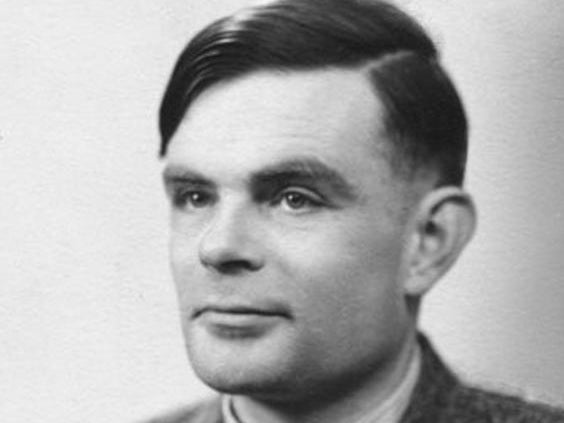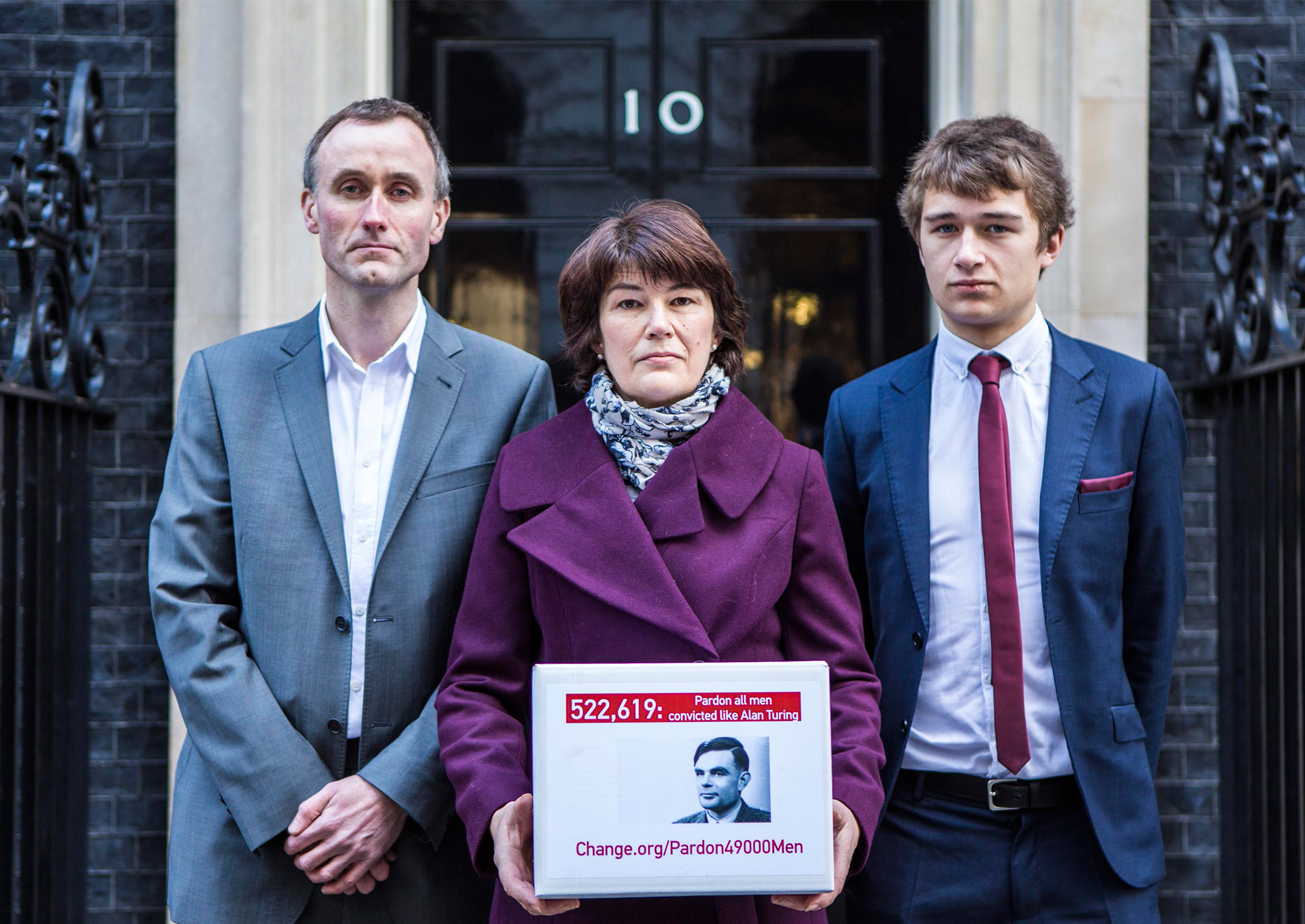Alan Turing: Why was the codebreaker convicted and pardoned for his sexuality?
‘Alan Turing’s contributions were far ranging and path breaking’
British scientist Alan Turing has been chosen to feature on the new £50 note, the Bank of England has announced.
Making the announcement at the Science and Industry Museum in Manchester on Monday, Bank of England Governor Mark Carney revealed the image depicting Turing and his work that will be used for the reverse of the note.
“Alan Turing was an outstanding mathematician whose work has had an enormous impact on how we live today,” Mr Carney said of the decision.
“As the father of computer science and artificial intelligence, as well as a war hero, Alan Turing’s contributions were far ranging and path breaking. Turing is a giant on whose shoulders so many now stand.”
Turing is best known for his work devising code-breaking machines during the Second World War and setting the foundations for work on artificial intelligence.
Despite his mathematical and scientific genius, Turing was also openly gay and in the 1950s was convicted of gross indecency for his relationship with a man.

From his conviction to royal pardoning, here’s everything you need to know about Turing.
Why was Turing convicted for homosexual acts?
In 1952, Turing was arrested for having a relationship with 19-year-old Arnold Murray as homosexuality was illegal at the time.
He later admitted to “acts of gross indecency” at a trial and underwent chemical castration.
The treatment involves the use of anaphrodisiac drugs to reduce libido and sexual activity. Turing received a castration treatment known as DES as an alternative to prison.
Previously, Turing had led a team of scientists, mathematicians and cryptographers who decoded secret German messages sent by Enigma machines during the Second World War.
However, Turing’s conviction meant he lost his security clearance and had to stop work at GCHQ – Bletchley’s postwar successor.
In 1954, he was found dead from cyanide poising at the age of 41. An inquest concluded that his death came as a result of suicide.
The law legalising homosexuality, which decriminalised homosexual acts in private between two men aged 21 or over, was passed in 1967, entitled The Sexual Offences Act 1967.
It is estimated that around 49,000 people were convicted under similar outdated laws until homosexuality was decriminalised in England.
What has been done to rectify this?
In 2009, Gordon Brown issued an apology on behalf of the government to Alan Turing.
Describing the treatment of the scientists as “horrifying” and “utterly unfair”, Brown said the country owned the mathematician a huge debt.
“We’re sorry, you deserved so much better,” Brown wrote in a statement published on the No 10 website.
The former prime minister added: “This recognition of Alan’s status as one of Britain’s most famous victims of homophobia is another step towards equality and long overdue.

“But even more than that, Alan deserves recognition for his contribution to humankind … It is thanks to men and women who were totally committed to fighting fascism, people like Alan Turing, that the horrors of the Holocaust and of total war are part of Europe’s history and not Europe’s present.
“So on behalf of the British government, and all those who live freely thanks to Alan’s work I am very proud to say: we’re sorry, you deserved so much better.”
When did Turing receive a posthumous royal pardon?
In 2013, Turing received a posthumous royal pardon almost 60 years after his conviction for gross indecency.
The pardon was granted under the Royal Prerogative of Mercy after a request by Justice Minister Chris Grayling.
Speaking of Turing, Mr Grayling said at the time of the pardon: “Dr Alan Turing was an exceptional man with a brilliant mind.
“His later life was overshadowed by his conviction for homosexual activity, a sentence we would now consider unjust and discriminatory and which has now been repealed.
“Turing deserves to be remembered and recognised for his fantastic contribution to the war effort and his legacy to science. A pardon from the Queen is a fitting tribute to an exceptional man.”
The pardon came into effect on 24 December following years of campaigning from Turing’s supporters.
In 2016, Theresa May said her government was “committed” to introducing an “Alan Turing law”, through an amendment to the Policing and Crime Bill, which would pardon thousands of gay men convicted under historic gross indecency crimes for consensual same-sex relationships.
“This government is committed to introducing posthumous pardons for people with certain historical sexual offence convictions who would be innocent of any crime now. We will bring forward our proposals in due course,” a government spokesperson told The Independent ahead of the law coming into force.
Rachel Barnes, the great niece of Mr Turing, who had long campaigned on the issue, told The Independent that the decision was “absolutely tremendous”.
Barnes described the decision as marking a “momentous day for all those who have been convicted under the historic laws, and for their families”.
She added: “The gross indecency law ruined peoples’ lives. As Alan Turing received a pardon, it is absolutely right that those who were similarly convicted should receive a pardon as well. It is great news for all those who have worked so hard for years to bring about this new legislation.”
Who has shown their support for Turing?
Benedict Cumberbatch, who played Turing in the 2014 film The Imitation Game, has previously spoken about the gross discrimination Turing suffered as a result of his sexuality and the need to recognise him on a bank note.
In an interview with The Telegraph, the actor said that he was “terrified” that persecution for people like Turing continues to exists.
“That’s what terrifies me – that it’s as prevalent now, and that this is how we treated one of our war heroes, and a great scientist, someone who’s up there with Charles Darwin; he should be on banknotes,” he told the publication. “I don’t think Alan set himself up as a martyr, but he sure as hell was treated as one in a sense.”

Television presenter Chris Packham has also spoken out in support of Turing over the years.
Earlier this year, Packham said in a speech that the Nazis’ Enigma machines were “no match” for the scientist’s “cunning and “wit”.
“But all he got, for all of his toil and all of our trouble, was a poisoned apple.
“A genius, a saviour, but he was also autistic and gay. So we betrayed him and drove him to suicide. Shame. Writ large. His death, an unforgiving tattoo on humanity’s conscience.”
Novelist Ian McEwan, gay rights campaigner Peter Tatchell, and scientist Richard Dawkins have also shown their support for Turing.
How will Turing feature on the new bank note?
The new £50 note, which comes weeks after the 50th anniversary of the 1969 Stonewall riots, will celebrate Alan Turing and his pioneering work with computers.
The design on the reverse of the note will feature a photo of Turing taken in 1951.

A quote from Alan Turing, given in an interview to The Times newspaper on 11 June 1949, will also feature, which reads: “This is only a foretaste of what is to come, and only the shadow of what is going to be.”
The scientist’s signature from the visitor’s book at Bletchley Park in 1947 will also be printed on the note.
Join our commenting forum
Join thought-provoking conversations, follow other Independent readers and see their replies
Comments
Bookmark popover
Removed from bookmarks